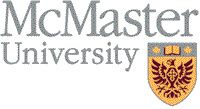
|
|

|
|

| Date : | Wednesday October 30, 2002. | Time : | 3:30pm |
|---|---|---|
| Address | Burke Science Building | |
| Room: | 138 |
Dr. Escobar received his undergraduate training in mathematics from Tufts University. He received his Ph.D. in Statistics from Yale University where he worked under the supervision of Professor John A. Hartigan. His doctoral thesis won the Leonard J. Savage Thesis Award in 1988. He was an assistant professor at Carnegie Mellon University from 1990 to 1994 when he moved to the University of Toronto where he has remained since then.

